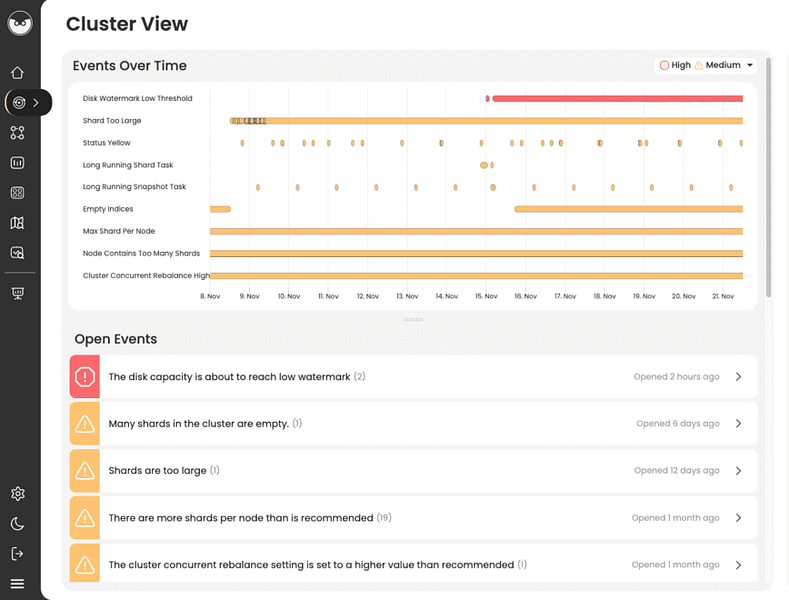Opster Team
Before you begin reading this guide, we recommend you try running the Elasticsearch Error Check-Up which analyzes 2 JSON files to detect many configuration errors.
Briefly, this error occurs when the master node in a cluster is no longer available or is unable to perform its duties. This can happen when the master node goes down or when the cluster is being reconfigured. To resolve the issue, check the status of the master node and the cluster, ensure there is enough disk space, and manually elect a new master node if necessary.
To easily locate the root cause and resolve this issue try AutoOps for Elasticsearch & OpenSearch. It diagnoses problems by analyzing hundreds of metrics collected by a lightweight agent and offers guidance for resolving them.
Take a self-guided product tour to see for yourself (no registration required).
This guide will help you check for common problems that cause the log ” node is no longer master for term ” to appear. To understand the issues related to this log, read the explanation below about the following Elasticsearch concepts: node, master and cluster.
Overview
To put it simply, a node is a single server that is part of a cluster. Each node is assigned one or more roles, which describe the node’s responsibility and operations. Data nodes store the data, and participate in the cluster’s indexing and search capabilities, while master nodes are responsible for managing the cluster’s activities and storing the cluster state, including the metadata.
While it is possible to run several node instances of Elasticsearch on the same hardware, it’s considered a best practice to limit a server to a single running instance of Elasticsearch.
Nodes connect to each other and form a cluster by using a discovery method.
Roles
Master node
Master nodes are in charge of cluster-wide settings and changes – deleting or creating indices and fields, adding or removing nodes and allocating shards to nodes. Each cluster has a single master node that is elected from the master eligible nodes using a distributed consensus algorithm and is reelected if the current master node fails.
Coordinating (client) node
There is some confusion in the use of coordinating node terminology. Client nodes were removed from Elasticsearch after version 2.4 and became coordinating nodes.
Coordinating nodes are nodes that do not hold any configured role. They don’t hold data and are not part of the master eligible group nor execute ingest pipelines. Coordinating nodes serve incoming search requests and act as the query coordinator running query and fetch phases, sending requests to every node that holds a shard being queried. The coordinating node also distributes bulk indexing operations and route queries to shards based on the node’s responsiveness.
Overview
An Elasticsearch cluster consists of a number of servers (nodes) working together as one. Clustering is a technology which enables Elasticsearch to scale up to hundreds of nodes that together are able to store many terabytes of data and respond coherently to large numbers of requests at the same time.
Search or indexing requests will usually be load-balanced across the Elasticsearch data nodes, and the node that receives the request will relay requests to other nodes as necessary and coordinate the response back to the user.
Notes and good things to know
The key elements to clustering are:
Cluster State – Refers to information about which indices are in the cluster, their data mappings and other information that must be shared between all the nodes to ensure that all operations across the cluster are coherent.
Master Node – Each cluster must elect a single master node responsible for coordinating the cluster and ensuring that each node contains an up-to-date copy of the cluster state.
Cluster Formation – Elasticsearch requires a set of configurations to determine how the cluster is formed, which nodes can join the cluster, and how the nodes collectively elect a master node responsible for controlling the cluster state. These configurations are usually held in the elasticsearch.yml config file, environment variables on the node, or within the cluster state.
Node Roles – In small clusters it is common for all nodes to fill all roles; all nodes can store data, become master nodes or process ingestion pipelines. However as the cluster grows, it is common to allocate specific roles to specific nodes in order to simplify configuration and to make operation more efficient. In particular, it is common to define a limited number of dedicated master nodes.
Replication – Data may be replicated across a number of data nodes. This means that if one node goes down, data is not lost. It also means that a search request can be dealt with by more than one node.
Common problems
Many Elasticsearch problems are caused by operations which place an excessive burden on the cluster because they require an excessive amount of information to be held and transmitted between the nodes as part of the cluster state. For example:
- Shards too small
- Too many fields (field explosion)
Problems may also be caused by inadequate configurations causing situations where the Elasticsearch cluster is unable to safely elect a Master node. This situation is discussed further in:
Backups
Because Elasticsearch is a clustered technology, it is not sufficient to have backups of each node’s data directory. This is because the backups will have been made at different times and so there may not be complete coherency between them. As such, the only way to backup an Elasticsearch cluster is through the use of snapshots, which contain the full picture of an index at any one time.
Cluster resilience
When designing an Elasticsearch cluster, it is important to think about cluster resilience. In particular – what happens when a single node goes down? And for larger clusters where several nodes may share common services such as a network or power supply – what happens if that network or power supply goes down? This is where it is useful to ensure that the master eligible nodes are spread across availability zones, and to use shard allocation awareness to ensure that shards are spread across different racks or availability zones in your data center.
Log Context
Log “node is no longer master for term”classname is Coordinator.java We extracted the following from Elasticsearch source code for those seeking an in-depth context :
try {
synchronized (mutex) {
if (mode != Mode.LEADER || getCurrentTerm() != clusterChangedEvent.state().term()) {
logger.debug(() -> new ParameterizedMessage("[{}] failed publication as node is no longer master for term {}";
clusterChangedEvent.source(); clusterChangedEvent.state().term()));
publishListener.onFailure(new FailedToCommitClusterStateException("node is no longer master for term " +
clusterChangedEvent.state().term() + " while handling publication"));
return;
}
if (currentPublication.isPresent()) {
Find & fix Elasticsearch problems
Opster AutoOps diagnoses & fixes issues in Elasticsearch based on analyzing hundreds of metrics.
Fix Your Cluster IssuesConnect in under 2 minutes

Arpit Ghiya
Senior Lead SRE at Coupa





